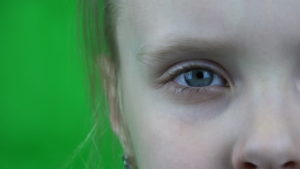Floaters and anxiety
Table of Contents
Table of Contents
Are you experiencing tiny specks or cobweb-like spots floating in your vision? Do you often worry about the unknown cause of these spots and fret about your vision’s clarity? If yes, then you are not alone as millions of people around the world suffer from eye floaters or spots, a common eye problem sometimes associated with anxiety.
Pain Points Related to Eye Floaters And Anxiety
Living with eye floaters can be a source of pain and anxiety for some people. It can make you doubt your vision’s health and trigger additional worrying thoughts about your eye condition. Frequent floaters can also interfere with your routine activities, making it challenging to read or concentrate on work.
What are Eye Floaters and Anxiety?
Eye floaters, also known as vitreous floaters, are tiny, moving specks that appear in your field of vision, mostly when you look at something bright, such as the sky or a computer screen. Anxiety, on the other hand, is a natural response to a stressful situation, which may manifest through physical symptoms like abdominal pain, chest tightness, or eye floaters. In some people, eye floaters might be a symptom of anxiety, as it could be a physical expression of a distorted thinking pattern.
Summary of Eye Floaters And Anxiety
Eye floaters are a standard eye disorder, and anxiety is a natural response to a stressful environment that could amplify the sensation of floaters. Both conditions are manageable with proper care and attention. Understanding the cause, symptoms, and treatment for eye floaters and anxiety is crucial, as they impact people’s daily activities and quality of life.
Eye Floaters And Anxiety – Personal Experience
As someone who has faced the challenges of eye floaters and anxiety, I understand how difficult it can be to live with these conditions. I noticed an increase in floaters when I started experiencing anxiety attacks, and it became hard for me to focus on work or even have conversations with people. It became an endless loop of worrying about my vision’s health and my anxiety symptoms.
 However, after consulting with my doctor and therapist, I learned about practices and exercises that helped me manage both anxiety and floaters. Simple breathing exercises and meditation helped me calm down my anxious thoughts, while regular eye exams and proper nutrition have significantly reduced the number of floaters I experience.
However, after consulting with my doctor and therapist, I learned about practices and exercises that helped me manage both anxiety and floaters. Simple breathing exercises and meditation helped me calm down my anxious thoughts, while regular eye exams and proper nutrition have significantly reduced the number of floaters I experience.
Treating Eye Floaters And Anxiety
Treating eye floaters depends on the underlying cause of the spots. In some cases, they might disappear on their own over time, while in severe cases, surgery may be necessary. For anxiety, treatment options include medication, therapy, and lifestyle changes like regular exercise and a healthy diet.
 ### Can Anxiety Cause Eye Floaters?
### Can Anxiety Cause Eye Floaters?
There is no conclusive evidence to support that anxiety causes eye floaters directly. However, anxiety can cause visual disturbances such as eye twitches, blurry vision, and eye strain that may exacerbate eye floaters. Therefore, managing anxiety symptoms can help reduce eye floaters and improve overall eye health.
 #### Prevention Tips for Eye Floaters
#### Prevention Tips for Eye Floaters
While eye floaters are a natural part of aging, taking care of your overall eye health can prevent them from occurring too early. Some tips for preventing or reducing eye floaters include:
- Regular eye exams
- Maintaining a healthy diet
- Wearing sunglasses outdoors
- Avoiding smoking and excessive alcohol consumption
- Limiting screen time and taking breaks frequently
Question and Answer: Eye Floaters And Anxiety
Q1. What are the common causes of eye floaters?
A. Eye floaters are a common age-related condition that occurs when vitreous humor in the eye degrades and clumps together. They may also develop due to retinal detachment, inflammation, or bleeding in the eye.
Q2. How can I manage anxiety symptoms that exacerbate eye floaters?
A. Simple relaxation techniques like deep breathing, yoga, meditation can help manage anxiety symptoms. Therapy and medication may also be effective in some cases.
Q3. Can eye floaters lead to blindness?
A. In most cases, eye floaters are harmless and don’t cause loss of vision. However, severe cases that accompany retinal detachment or bleeding in the eye may require prompt medical attention.
Q4. How can I prevent eye floaters?
A. You can prevent or reduce eye floaters by maintaining a healthy diet, wearing sunglasses outdoors, and avoiding activities that put a strain on your eyes.
Conclusion of Eye Floaters And Anxiety
Eye floaters are a common eye problem that can occur in many people, often associated with anxiety symptoms. Understanding their causes and available treatment can help manage the symptoms and minimize the impact on daily life. By taking care of your overall eye health and managing anxiety effectively, you can live a healthy and fulfilling life, free of the constraints of eye floaters.
Gallery
Eye Floaters: What Are They, Causes, And Treatment | MyVision.org

Photo Credit by: bing.com /
Can Anxiety Cause Eye Floaters And Flashes

Photo Credit by: bing.com /
Eye Floaters Stress And Anxiety

Photo Credit by: bing.com / anxiety floaters flickering annoying flashing
Can Anxiety Cause Eye Floaters And Flashes

Photo Credit by: bing.com /
Floaters And Anxiety - Anxietycentre.com

Photo Credit by: bing.com / floaters eye squiggly






